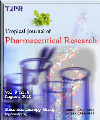
|
Tropical Journal of Pharmaceutical Research
Pharmacotherapy Group, Faculty of Pharmacy, University of Benin, Benin City, Nigeria
ISSN: 1596-5996
EISSN: 1596-5996
Vol. 16, No. 1, 2017, pp. 141-147
|
 Bioline Code: pr17018
Bioline Code: pr17018
Full paper language: English
Document type: Research Article
Document available free of charge
|
|
|
Tropical Journal of Pharmaceutical Research, Vol. 16, No. 1, 2017, pp. 141-147
| en |
Prevalence of qnr, intI, and intII genes in extended-spectrum beta-lactamase (ESBL)-producing Escherichia coli  isolated from clinical samples in Iran isolated from clinical samples in Iran
Hadizadeh, Morteza; Norouzi, Amin; Taghadosi, Rohollah; Mohebi, Samane; Mohammadi, Mohsen; Hasanzadeh, Amir & Moghadam, Majid Taati
Abstract
Purpose: To investigate the prevalence of qnr, intI, and intII genes in extended spectrum beta-lactamase
(ESBL)-producing Escherichia coli isolated from clinical samples in Kerman, Iran.
Methods: A total of 127 E. coli were collected from clinical samples in Kerman hospitals. The antibiotic
susceptibility test was performed using disc diffusion method, while the presence of ESBL-producing E.
coli was determined by phenotypic confirmatory test. Furthermore, the presence of qnrA, qnrB, qnrS,
intI, intII, and β-lactamase-encoding genes was detected by polymerase chain reaction (PCR). Finally,
the data were analyzed and associations between different genes and antibiotic resistance were
evaluated.
Results: The highest and lowest rates of resistance were observed against ampicillin (72.4 %) and
imipenem (2.3 %), respectively. Also, 41.7 % of the isolates produced ESBL-enzymes. The qnrS and
genes were detected in 6.3 and 0.78 %, respectively, of the isolates, while qnrA gene was not detected
in the current study. The results revealed that 64.5 and 10.2 % of isolates carried intI and intII genes,
respectively. Data analysis showed a significant association between ESBL production and class I
integrin gene in E. coli isolates.
Conclusions: Due to the variation in the resistance patterns of E. coli against antibiotics in different
geographical regions, antimicrobial treatments should be based on local experience. Also, the
coexistence of ESBL and intI gene in the majority of E. coli isolates suggests that care should be taken
in choosing antibiotic therapy.
Keywords
Extended-spectrum β-lactamase; E. coli; Integrin; Imipenem; Bacterial genes; Antibiotic resistance
|
| |
© Copyright 2017 - Pharmacotherapy Group, Faculty of Pharmacy, University of Benin, Benin City, 300001 Nigeria.
Alternative site location: http://www.tjpr.org
|
|
